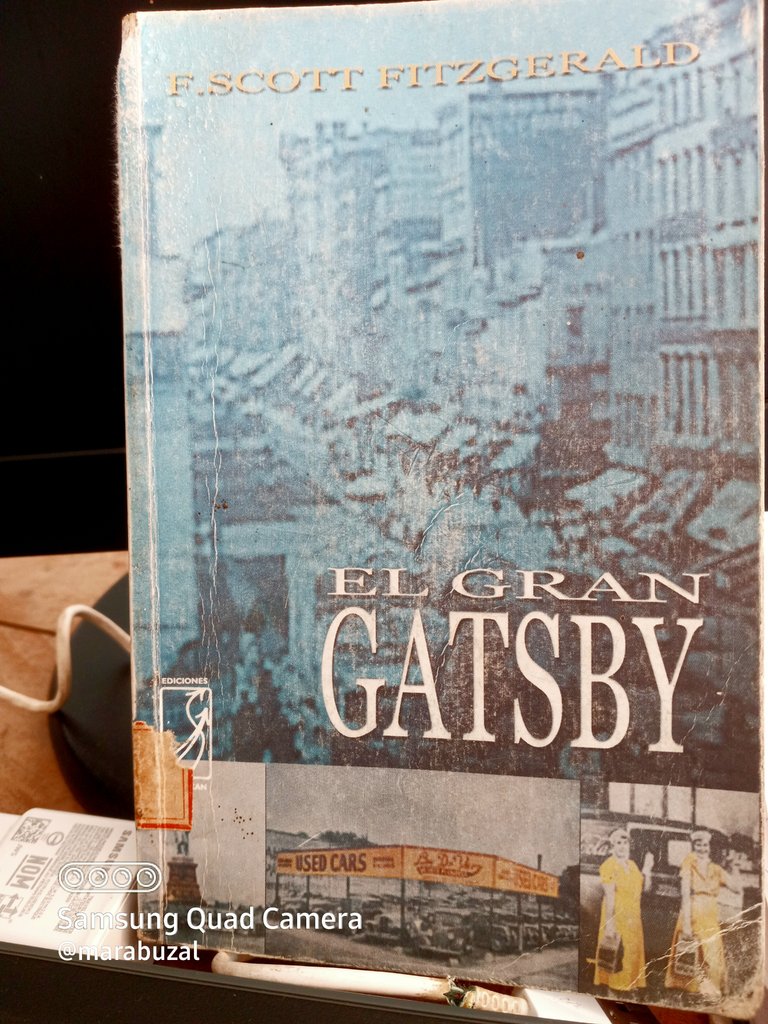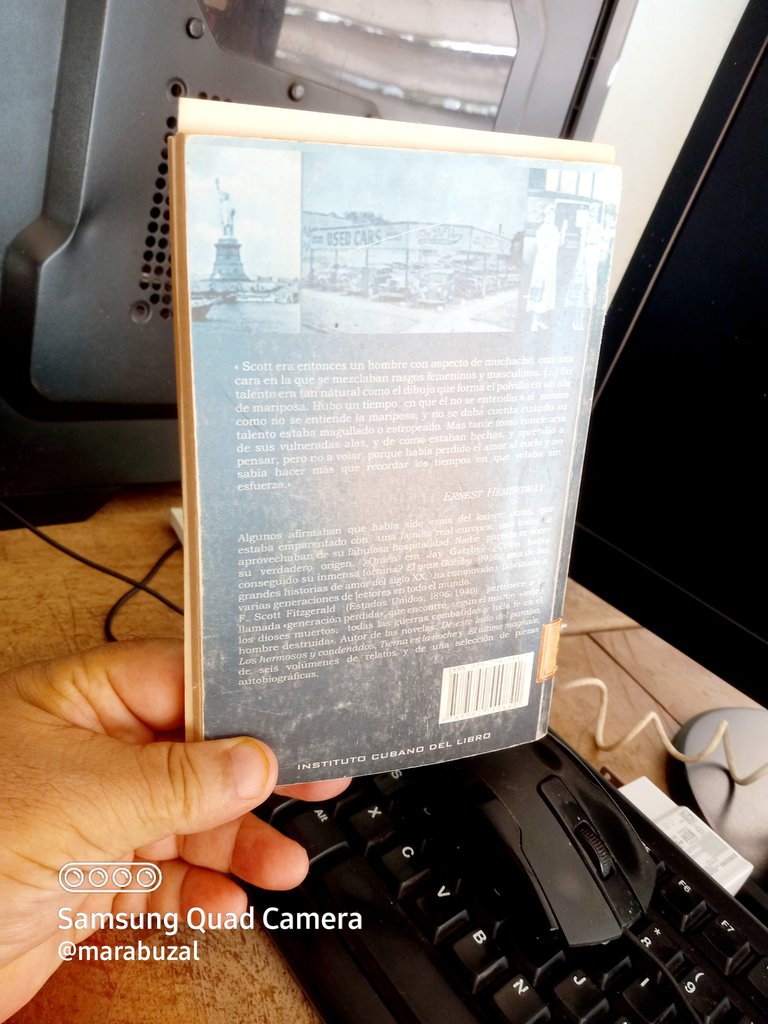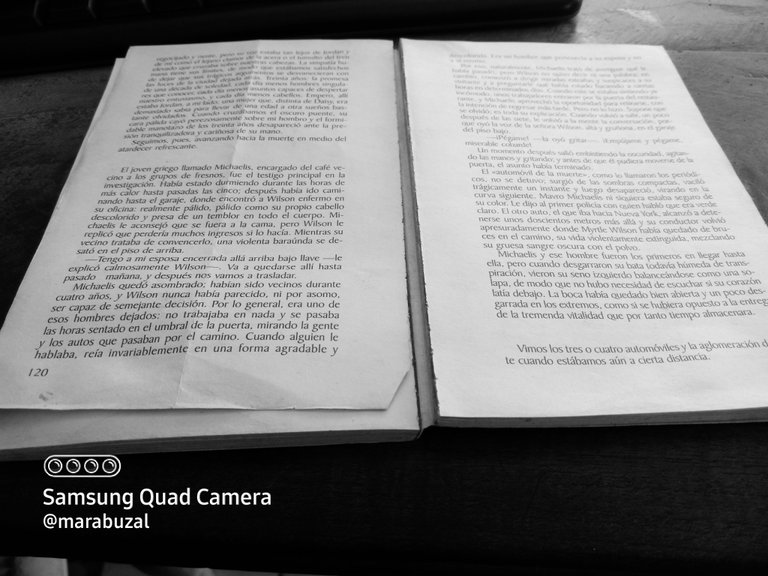¡Saludos y afectos #hivebookclub!
"En mis primeros y más tiernos años, mi padre me dio un consejo que desde entonces hago dar vueltas en mi mente..."
Esa frase inicial de El Gran Gatsby no es solo una entrada a la novela, sino un portal a todo un universo de anhelos y desengaños. Me atrevo a decir que en esta novela Fitzgerald no está simplemente contando una historia, sino revelando una verdad sobre la condición humana.

Para mi Gatsby es como un talismán, tiene la magia de las obras maestras: cada vez que lo abro me dice algo nuevo. Para algunos Jay Gatsby es el personaje más trágico y poético de la literatura norteamericana.
"¿Que no se puede repetir el pasado? —exclamó Gatsby, indignado— ¡Claro que se puede!".
Esta declaración, tan patética como sublime, encapsula la esencia de su personaje: un hombre que ha construido un imperio de mentiras piadosas con la sola esperanza de rescatar un instante perdido de felicidad.
La genialidad de Fitzgerald reside en cómo transforma esta obsesión particular en una metáfora universal. El Valle de las Cenizas, con su paisaje desolado de chimeneas industriales y polvo gris, representa el costado oculto del Sueño Americano.
Los ojos del Doctor T.J. Eckleburg, ese enorme cartel que vigila el camino como un dios abandonado, nos interrogan: "¿Hasta qué punto somos dueños de nuestros destinos?".
La relación entre Scott y Zelda Fitzgerald fue tan tormentosa como fascinante. Muchos ven en Daisy Buchanan un reflejo de Zelda: esa belleza sureña caprichosa y destructiva que Fitzgerald amó hasta la obsesión.
"Eran gente despreocupada, Tom y Daisy: destrozaban cosas y seres y luego se refugiaban en su dinero".
La frase es una de las más demoledoras del libro, parece prefigurar el propio matrimonio Fitzgerald, donde el amor se mezclaba con la envidia creativa y la autodestrucción.
Zelda, una artista frustrada, llegó a acusar a Scott de plagiar sus cartas personales para sus novelas. Esta tensión quizás explique por qué Daisy es un personaje tan ambiguo: adorada y detestable a la vez, como ese "sonido lleno de dinero" que Gatsby escucha en su voz.
La compleja amistad entre Hemingway y Fitzgerald ofrece un contrapunto perfecto para entender Gatsby.
Mientras Hemingway buscaba la verdad en frases cortas y hechos concretos, Fitzgerald la encontraba en la poesía de lo efímero.
Donde Hemingway escribía "El mundo rompe a todos", Fitzgerald respondía con "Gatsby creía en la luz verde, en el futuro orgiástico que año tras año retrocede ante nosotros...".
Hemingway menospreciaba el estilo lírico de Fitzgerald, pero incluso él reconoció que Gatsby era "el mejor libro norteamericano escrito hasta entonces".
La paradoja es deliciosa: el escritor más "masculino" de su generación rindiéndole homenaje al más frágil y poético.

Las fiestas en la mansión de Gatsby son el símbolo perfecto de los locos Años Veinte: un carnaval de champán, jazz y desenfreno que oculta un vacío existencial.
Fitzgerald, que vivió ese período en primera persona, captura su esencia en detalles como:
"Las orquestas tocaban amarillo cocktail music".
"En su habitación, las camisas de seda se amontonaban en cascadas de colores".
Pero bajo este brillo superficial late una crítica feroz. La escena donde Gatsby arroja sus camisas caras para impresionar a Daisy es tan conmovedora como grotesca: "Ella lloró cuando vio las camisas... Nunca había visto prendas tan hermosas".
Muchas líneas de Gatsby merecen leerse en voz alta, saboreando cada palabra. Te propongo algunas:
"Sigamos remando, botes contra la corriente, llevados incesantemente hacia el pasado" (el final perfecto).
"El encanto de ella radicaba en que no había hecho nada para merecerlo" (sobre Daisy).
"Era uno de esos raros seres cuyo gesto transmite absoluta seguridad" (la primera descripción de Gatsby).
Esta novela sobrevive porque habla de algo eterno: la lucha entre la realidad y nuestros sueños.
Gatsby no muere por balas, sino por su incapacidad de aceptar que "no se puede repetir el pasado".
Su tragedia nos conmueve porque, en el fondo, todos tenemos nuestra propia "luz verde": ese futuro brillante que siempre parece al alcance de la mano pero que se aleja mientras avanzamos.
Fitzgerald murió en 1940, creyéndose un fracasado. No pudo saber que su obra definiría todo un siglo.
Gatsby creía en la luz verde, y esa fe obstinada en lo imposible es quizás lo más noble (y lo más humano) que hay en nosotros.

Por eso este libro no es solo literatura: es como un espejo donde miranos y encontrar algo.
"La verdadera prueba de una primera clase inteligencia es la capacidad de sostener dos ideas opuestas en la mente al mismo tiempo, y aún conservar la capacidad de funcionar", escribió Fitzgerald.
Gatsby es cruel, compasivo, cínico y romántico, realista y mágico. Como la vida.
Reseña e imágenes de mi Autoría.

VERSIÓN EN INGLÉS
Greetings and warm regards #hivebookclub!
"In my younger and more vulnerable years, my father gave me some advice that I've been turning over in my mind ever since..."
This opening line of The Great Gatsby isn't just an introduction to the novel, but a portal to an entire universe of longing and disillusionment. I dare say that in this work, Fitzgerald isn't simply telling a story - he's revealing a truth about the human condition.

To me, Gatsby is like a talisman, possessing the magic of masterpieces: every time I open it, it tells me something new. For some, Jay Gatsby is the most tragic and poetic character in American literature.
"'Can't repeat the past?' Gatsby cried incredulously. 'Why of course you can!'"
This declaration, as pathetic as it is sublime, encapsulates the essence of his character: a man who has built an empire of white lies with the sole hope of rescuing a lost moment of happiness.
Fitzgerald's genius lies in how he transforms this particular obsession into a universal metaphor. The Valley of Ashes, with its desolate landscape of industrial chimneys and gray dust, represents the hidden side of the American Dream.
The eyes of Doctor T.J. Eckleburg, that enormous billboard watching over the road like an abandoned god, interrogate us: "To what extent are we masters of our own destinies?"
The relationship between Scott and Zelda Fitzgerald was as stormy as it was fascinating. Many see in Daisy Buchanan a reflection of Zelda: that capricious, destructive Southern belle whom Fitzgerald loved to the point of obsession.
"They were careless people, Tom and Daisy—they smashed up things and creatures and then retreated back into their money."
This is one of the most devastating lines in the book, seemingly foreshadowing the Fitzgeralds' own marriage, where love mixed with creative envy and self-destruction.
Zelda, a frustrated artist, once accused Scott of plagiarizing her personal letters for his novels. This tension perhaps explains why Daisy is such an ambiguous character: both adored and detestable, like that "sound full of money" Gatsby hears in her voice.
The complex friendship between Hemingway and Fitzgerald offers the perfect counterpoint to understanding Gatsby.
While Hemingway sought truth in short sentences and concrete facts, Fitzgerald found it in the poetry of the ephemeral.
Where Hemingway wrote "The world breaks everyone," Fitzgerald responded with "Gatsby believed in the green light, the orgastic future that year by year recedes before us..."
Hemingway dismissed Fitzgerald's lyrical style, but even he recognized that Gatsby was "the best American novel written up to that time."
The paradox is delicious: the most "masculine" writer of his generation paying homage to the most fragile and poetic.

The parties at Gatsby's mansion are the perfect symbol of the Roaring Twenties: a carnival of champagne, jazz and revelry masking an existential void.
Fitzgerald, who lived through that period firsthand, captures its essence in details like:
- "The orchestra was playing yellow cocktail music."
- "In his bedroom, the silk shirts piled up in cascades of color."
But beneath this superficial glitter lies a fierce critique. The scene where Gatsby throws his expensive shirts to impress Daisy is as moving as it is grotesque: "She cried when she saw the shirts... She had never seen such beautiful shirts before."
Many lines from Gatsby deserve to be read aloud, savoring every word. I suggest a few:
- "So we beat on, boats against the current, borne back ceaselessly into the past." (The perfect ending.)
- "It excited him, too, that many men had already loved Daisy—it increased her value in his eyes." (About Daisy.)
- "He smiled understandingly—much more than understandingly. It was one of those rare smiles with a quality of eternal reassurance in it." (The first description of Gatsby.)
This novel endures because it speaks to something eternal: the struggle between reality and our dreams.
Gatsby doesn't die from bullets, but from his inability to accept that "you can't repeat the past."
His tragedy moves us because, deep down, we all have our own "green light": that brilliant future that always seems within reach yet eludes us as we move forward.
Fitzgerald died in 1940, believing himself a failure. He never knew his work would define an entire century.
Gatsby believed in the green light, and that stubborn faith in the impossible is perhaps the noblest (and most human) thing about us.

That's why this book isn't just literature: it's like a mirror where we see ourselves and find something.
"The test of a first-rate intelligence is the ability to hold two opposed ideas in mind at the same time and still retain the ability to function," Fitzgerald wrote.
Gatsby is cruel, compassionate, cynical and romantic, realistic and magical. Just like life.
Review and images by me.

Confieso que antes de leer la novela, primero vi la pelicula con Leonardo D Caprio como protagonista. Pero de ahí corrí a descargar el libro y lo leí digital.
Es una joya, sin duda alguna.
Ganancia intelectual y espiritual sin dudas.
La historia es fascinantemente inolvidable, como ciertas cosas, como ciertos tiempos y colores ..
Lo leí por recomendación de mi papá 🥹
Me transportaste en el Tiempo, y ahora señalas en tan formidable reseña algunos detalles por los que voy a volver a sus páginas ✨🫂👏
Muy sabios son nuestros viejos.
Gracias por comentarlo bienvenido a mi blog.
Está novela tiene la capacidad de sorprender cada vez.
✨
Descubrí está historia a través de la película con Leonardo DiCaprio, quedé impresionada y encantada con todas las verdades que se hablan en ella. No he leído el libro pero debe ser mucho más maravilloso que la propia película, espero poder hacerlo en algún momento. Excelente reseña 🤗
Muchas gracias por llegar.
Esta es una historia memorable. Ni te deja indiferente de ninguna manera.
Cuando leas el libro estoy seguro lo vas a disfrutar muchísimo.
I loved that you mentioned some lines there. The opening is really great. Your review about the book is also wonderful. Thanks!
Te agradezco infinitamente el comentario, es una gran obra de la literatura norteamericana y universal.
Bienvenido mi blog.
Vi el filme, no he leído el libro. Con esta reseña dan ganas de leer. Gracias por compartirlo 👏👏👏
Me convenciste valla, ahora mismo arranco para la librería a comprarlo, creo que lo ví por estos días en una edición nueva. Luego te cuento que me pareció.
Pues muy bien.
Que una reseña logre ese tipo de cosas es ganancia intelectual mutua.
Ya me dirás. Hay clásicos y clásicos. Gatsby clasifica entre los grandes.
Afectos y agradecimiento a #hivebookclub por abrir sus páginas a la Lectura.